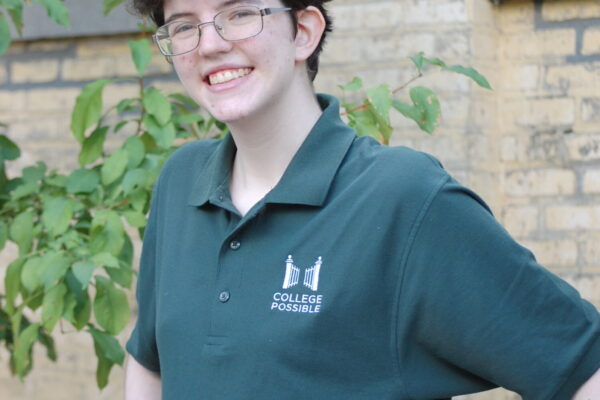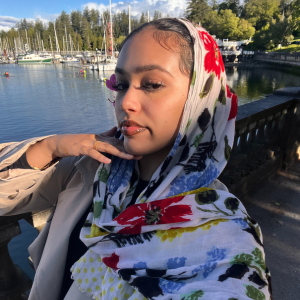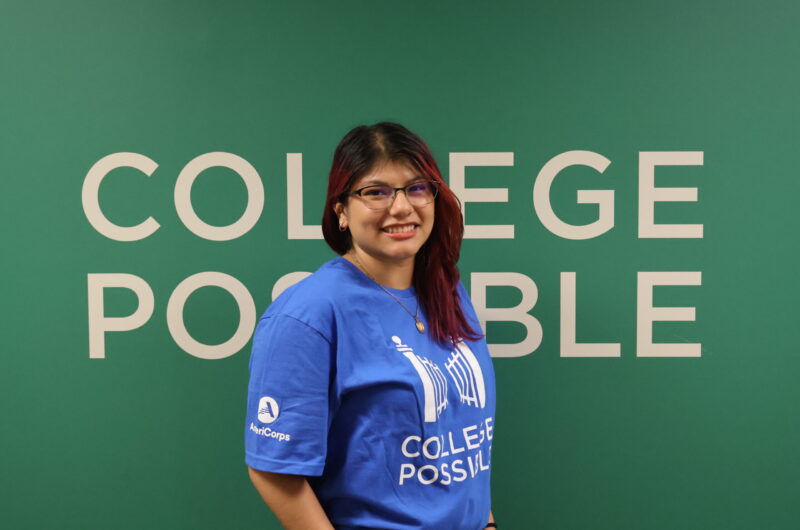Francis Burke (they/them/theirs), a graduate of the University of Chicago, is in their first year serving with College Possible as an AmeriCorps coach. Growing up, nearly everyone they knew was familiar with the “standard college advice,” and many of their classmates spent all four years of high school thinking about and planning for college.
At the end of their senior year of college, Francis was researching nonprofit jobs and saw that College Possible was looking for individuals to serve as a near-peer coaches dedicated to supporting students during the college admissions process, all the way through college graduation.
Francis assumed that most of the college admissions information they and their classmates had was common knowledge, even among people who weren’t planning on continuing their education. Since starting at College Possible, they’ve realized that the degree planning and advice many of us take for granted isn’t common knowledge for every high school student. They’ve also learned more about the institutional barriers that can make it more difficult for people to attend and graduate college.
One way we see inequitable institutional barriers manifest is the procedural knowledge gap. For instance, for students lacking advice and intergenerational knowledge of how to deal with common barriers of college access, it becomes very difficult to find solutions to solvable problems! If students do not know about a possibility, they cannot take advantage of it. Some of Francis’ College Possible students didn’t know about college application fee waivers or about alternative student loan repayment options until they had the guidance of a near-peer coach to help them navigate the costs of college.
Francis encountered another example of a barrier that students from minority groups often face, as they were helping a student with the FAFSA application. Like many Hispanic students, the student Francis was helping had two last names that are not hyphenated. When the student put her name into the application, despite entering it exactly as it was printed on her social security card, the Social Security Administration (SSA) was not able to match it up with official records. Eventually, Francis was able to figure out that the SSA had categorized one of her last names as a middle name, and she had to leave that last name off her application.
“I am motivated to serve with College Possible because I want all students with college aspirations to be able to reach their goals,” said Francis. “Even when students are hard-working, motivated, and academically-prepared, they often don’t have the information or resources they need to achieve their college goals. I want to help change that.”
Through their tenure at College Possible, Francis has seen how students are driven and motivated to pursue their college goals when they have the necessary tools and information to help them succeed. Many students have done significant research into identifying their best-fit colleges in order to pick a school that aligns with their career goals. Students are often navigating the college process without help or support from their family members, including completing financial aid applications with limited assistance. Many of them are completing all this while balancing substantial commitments, such as caring for younger siblings or working an after-school job. These extra duties are often disproportionately necessary for students from lower socioeconomic backgrounds, creating a disparity in amount of “free time.”
“College Possible is important because it helps to provide students with the resources and tools they need to navigate the college process” said Francis. “If College Possible didn’t exist, those students might not have anyone who could answer their questions and support them through the many barriers students face every day.”
Are you or someone you know looking to make a difference in students’ lives? Learn more about serving as a College Possible AmeriCorps coach today!



